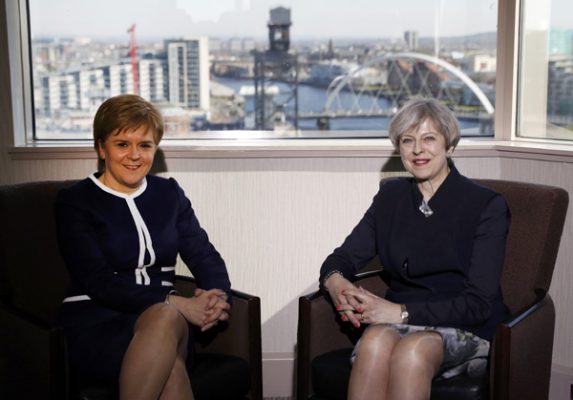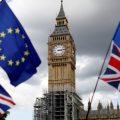
LONDON – British Prime Minister Theresa May and Scotland’s first minister Nicola Sturgeon met Monday, just 24 hours before the Scottish Parliament’s scheduled vote for a second independence referendum.
The meeting in a Glasgow hotel room also came just 48 hours before May finally triggers the unstoppable process to signal Britain’s departure from the European Union.
Sturgeon wants a second independence referendum before Britain’s Brexit deal is agreed by Brussels. May says she doesn’t want an independence referendum until a deal with Brussels is resolved.
Despite the smiles and friendliness of Monday’s meeting, both leaders demonstrated they were not for changing their minds.
The private meeting between the pair lasted for an hour during a day trip to Scotland by May.
Later Sturgeon described their talks as cordial, adding she was frustrated by “a process that appears not to be listening.”
In a media interview later, Sturgeon said she had wished the prime minister well for the forthcoming Brexit negotiations with the EU.
But she said she had been frustrated that May had not made any concessions over the first minister’s demands for a distinctive Brexit deal for Scotland.
The Scotsman newspaper in Scotland reported that when asked about what would happen if Sturgeon’s call for another referendum was formally rejected, the SNP leader replied: “I will set that out in due course. I actually have views in my mind around that. If their (May’s government) position remains as it is right now, I will set out to parliament what I think the next steps should be.”
Earlier, May addressed civil servants at a government office in East Kilbride, talking about the importance of the United Kingdom sticking together.
Hailing her Plan for Britain, May said she believes when the country works together, there is no limit to what can be achieved.
“In Scotland, Wales and Northern Ireland that means fully respecting, and indeed strengthening, the devolution settlements. But never allowing our union to become looser and weaker, or our people to drift apart,” said May.
Political observers saw the event as May travelling to Scotland, virtually hours before Brexit to put her stamp on her call for unity across the United Kingdom.
May concluded her speech with the message: “As Britain leaves the European Union, and we forge a new role for ourselves in the world, the strength and stability of our union will become even more important.”
Earlier Monday Sir Keir Starmer, the main opposition Labour Party’s shadow secretary for Brexit, delivered a keynote speech at Chatham House in London.
Starmer said Chatham House had seen many debates over the years, but none as significant for Britain in recent history.
“On the eve of the triggering of Article 50, I and the Labour Party, will hold the government to account and provide an alternative vision of our place in Europe. June 23 last year (the day of the national EU referendum) answered one question but opened up many more — particularly about the UK’s future relationship with Europe,” said Starmer.
Outlining a series of six “Brexit” tests the opposition party has set, Starmer described the stakes as high, and said the Prime Minister’s approach so far does not bode well.
“Labour will not support a deal that fails to reflect core British values and the six tests I have set out today,” said Starmer.


